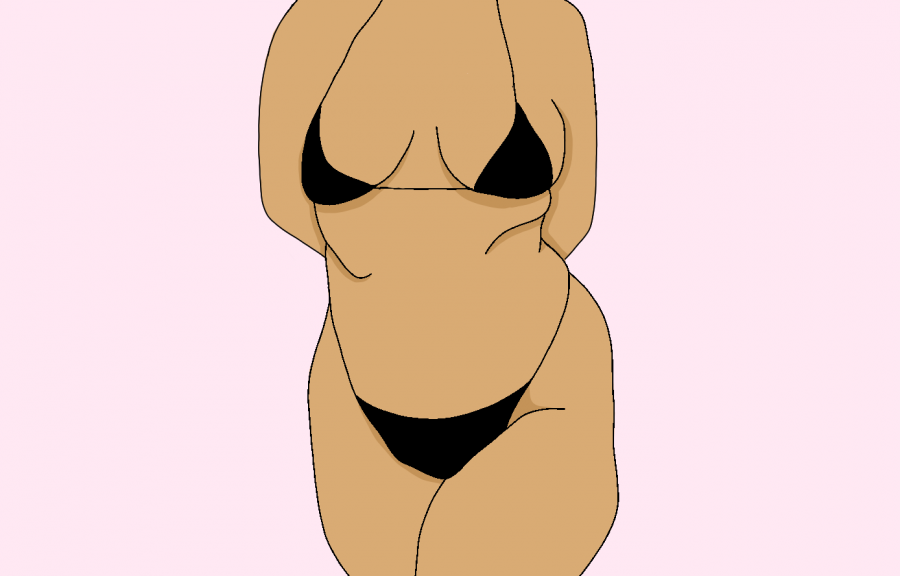Opinion | Sometimes neutral is positive
April 13, 2021
It was a beautiful, 80-degree day in Pittsburgh. Colorful hammocks dotted Cathy Lawn and Schenley Park with pops of color, the clouds looked like thick dollops of whipped cream painting the sky and campus felt like life was pulsing through it once again.
As I walked through campus, I welcomed any breeze that provided a temporary respite from the heat. I looked around at everyone lounging in the grass, playing spikeball on the lawn and soaking in the gift of Mother Nature. It felt like the weather almost knew that we needed a kiss of sun to wake us from the monotony, burnout and inevitable onslaught of an imminent finals season.
But as I made my way down Fifth Avenue, I fidgeted with my clothes and my anxiety started to bubble. It was hot, much hotter than I anticipated considering I spent the majority of last summer inside. I was in a long pair of jean pants, a cotton shirt and the longer I walked the hotter and stickier I became.
My inner dialogue took a turn for the negative as I kept passing people in shorts and crop tops, dresses, skirts and flowy tops. I felt so out of place, and — naturally — I started blaming myself.
The denim began to suction onto my thighs, and my jeans turned more into leather pants from the way my sweat painted them to my body.
I was so frustrated at myself for not being comfortable in shorts and crop tops and sports bras. I must be a failure, I thought. I couldn’t even take the positivity that I preached to others about their bodies and apply it to myself.
The whole time when I was putting myself down for what I wore and then critiquing myself for not being a good advocate, I was missing the point. Sometimes waking up and feeling like a sexy animal is too tall of an order. Instead, focusing on actions that range from day-to-day chores to big accomplishments like reaching a personal best or even getting an assignment done can be more manageable. That’s exactly what the practice of body neutrality encourages.
Body neutrality focuses on a body’s non-physical attributes. It looks more closely at your body’s abilities as a way to disengage your mind from the aesthetic debate that goes on around us all the time. Body neutrality talks about ability over appearance, recognizing that not every day will be a day that you can love yourself, and encouraging constructive dialogue over toxic positivity.
However, my discussion of body neutrality does not eliminate the importance of the body positivity movement, which was started by fat, queer, Black women, as a result of the marginalization of their bodies by the maintstream culture.
Since its founding, the body positivity movement has been white-washed and co-opted by bodies of all sizes. Although the concept of self love at any size is important, the message of the body positivity movement became diluted, and the fat and socially stigmatised bodies it seeked to liberate remain marginalized.
These ideas are not mutually exclusive and in fact can be used in tandem. Using body neutrality and taking a moment to acknowledge all that your body can do certainly does not silence the negativity, but it does add another voice to the dialogue. Our bodies change, grow, shrink, stretch, move, flow and carry us through every day — including the ones that legitimately felt like they couldn’t have gone any worse.
On the days when you can’t find the words to love your body, body neutrality encourages you to find the words to respect it. I cannot love something that I do not respect, even if it is my own flesh and bones. Finding a way around the appearance debate forced me to change my internal dialogue.
All bodies change and grow. Especially during COVID-19, when over 61% of adults reported undesired weight change, weight fluctuation is normal and does not indicate a lack of self control. We’ve all heard it more times than we care to count, but we’re living through a global health crisis. Gaining 15 pounds after your entire daily routine was changed is not a moral failing.
Gaining weight in general needs no explanation. To be perfectly candid, fear of gaining weight is internalized fat phobia and stems from weight stigma. Your body does not exist to look a certain way or be a certain number.
Our worth cannot be quantified by looks and appearance. The number on a scale is not a measurement of how far you can go, what you can accomplish or your impact on others. No number can define you, and you shouldn’t define others by their numbers or appearance.
As the weather continues to grow warmer, discomfort around weight can rise. Conversations about summer bodies, trying on clothes we haven’t worn in months and even the change in fashion and clothing type can be alarming and discomforting for many people, myself included.
In the midst of those feelings and insecurities, it’s harder to find the voice inside of yourself to be confident and positive. Instead of jumping on toxic positivity and ignoring your feelings, change the narrative completely by not addressing how you look and focusing on what you can do.
Body neutrality to me is congratulating myself for getting through a walk in full jean pants on an 80-degree day. It’s saying, “I might not feel sexy or beautiful, but I did so many other things.” The things that I do each day — no matter how big or how small — will always outweigh the importance of my looks.
Anne Marie typically writes about unapologetically doing her thing. Write to her at [email protected].




